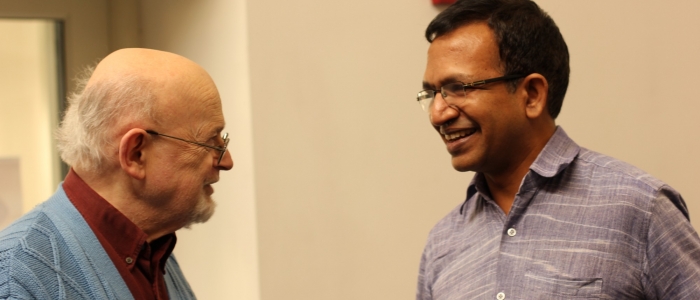Professor Emeritus Joe Sucher, a UMD faculty member for 41 years, died on Oct. 18 at the age of 89. A memorial was planned for Sunday, March 15, 2020, but was postponed indefinitely due to coronavirus concerns. In commemoration of Joe's 90th birthday in September, 2020, his son Anatol produced a memorial program, which can be downloaded here.
Joe joined UMD in 1957, after earning his Ph.D. from Columbia University with a thesis on the quantum electrodynamics of the helium atom. He is best known for work on the relativistic theory of many-electron atoms, the quantum theory of long-range forces, the foundations of relativistic quantum theory, the Gellman-Low-Sucher level-shift formula, the no-pair Hamiltonian for many-electron atoms, the Levy-Sucher identity, the Dirac-Sucher equation and the Feinberg-Sucher formula for the long-range force between neutral atoms. He was a devoted educator and was named a UMD Distinguished Scholar-Teacher in 1989.
Two years ago, he established the Joseph and Dorothy Sucher Graduate Prize in Relativistic Theoretical Physics to remember Dorothy, his wife of 58 years. She was a psychotherapist and a writer for the Greenbelt News Review whose work resulted in a landmark Supreme Court decision upholding freedom of the press. Her last writing project took her to Russia and Belarus shortly after the fall of the Soviet Union, as she tried to piece together the history of her grandparents before they emigrated to the U.S. After her death, Joe and his son Anatol completed the work, Return to the Shtetl.
A native of Vienna, Joe was forced with his family to flee Hitler’s Nazism. He escaped from Austria in 1938, and after a harrowing trek though Germany, Luxembourg, France, Spain and Portugal, arrived in the United States at age 10. He described the odyssey in a 2014 oral history interview with the United States Holocaust Memorial Museum.
Joe was well-known in the department for his great wit, his unfailing charm and his memorable lyrics; he often graced departmental gatherings with impressive poems, such as one he wrote on the 50th anniversary of the tradition of Physics Tea.










